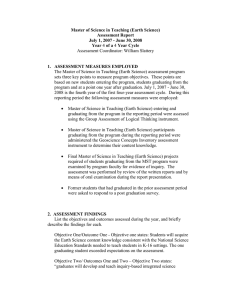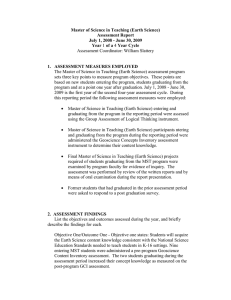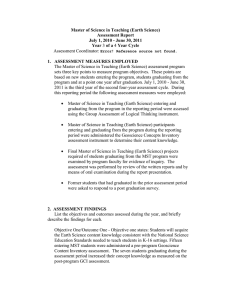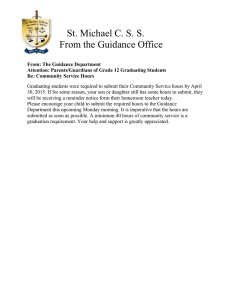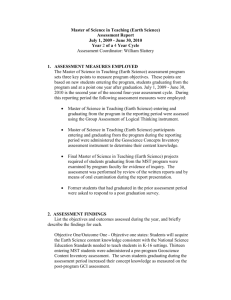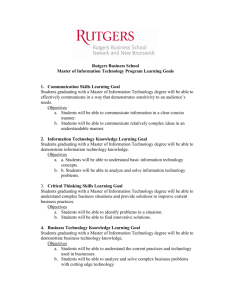Master of Science in Teaching (Earth Science) Assessment Report Year
advertisement
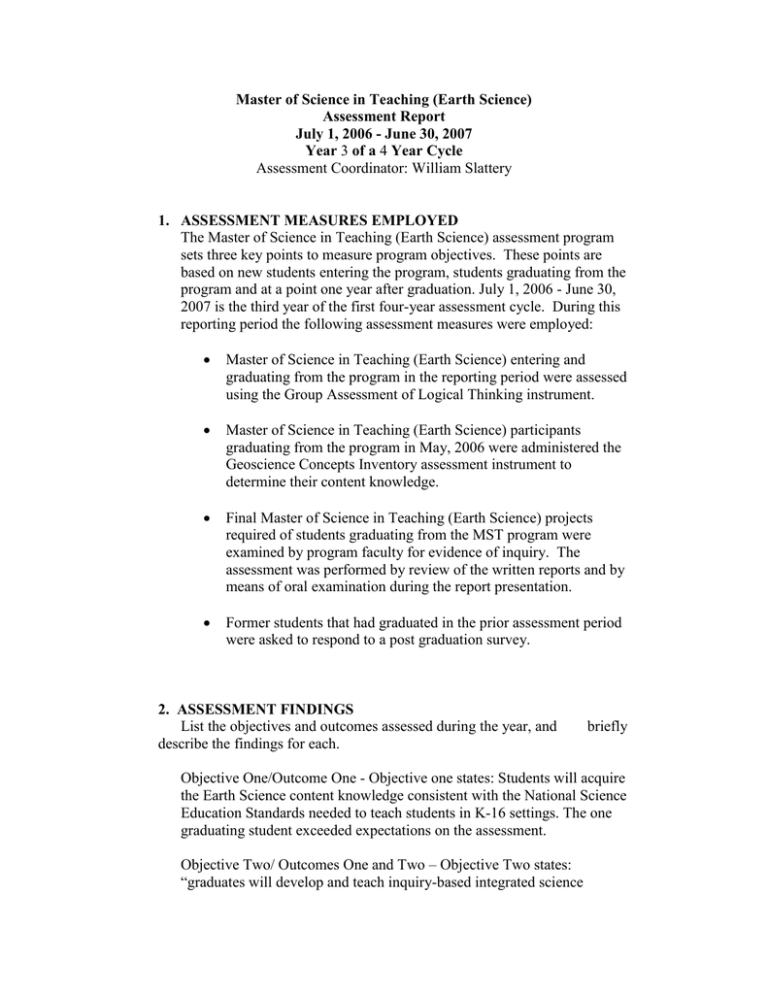
Master of Science in Teaching (Earth Science) Assessment Report July 1, 2006 - June 30, 2007 Year 3 of a 4 Year Cycle Assessment Coordinator: William Slattery 1. ASSESSMENT MEASURES EMPLOYED The Master of Science in Teaching (Earth Science) assessment program sets three key points to measure program objectives. These points are based on new students entering the program, students graduating from the program and at a point one year after graduation. July 1, 2006 - June 30, 2007 is the third year of the first four-year assessment cycle. During this reporting period the following assessment measures were employed: Master of Science in Teaching (Earth Science) entering and graduating from the program in the reporting period were assessed using the Group Assessment of Logical Thinking instrument. Master of Science in Teaching (Earth Science) participants graduating from the program in May, 2006 were administered the Geoscience Concepts Inventory assessment instrument to determine their content knowledge. Final Master of Science in Teaching (Earth Science) projects required of students graduating from the MST program were examined by program faculty for evidence of inquiry. The assessment was performed by review of the written reports and by means of oral examination during the report presentation. Former students that had graduated in the prior assessment period were asked to respond to a post graduation survey. 2. ASSESSMENT FINDINGS List the objectives and outcomes assessed during the year, and describe the findings for each. briefly Objective One/Outcome One - Objective one states: Students will acquire the Earth Science content knowledge consistent with the National Science Education Standards needed to teach students in K-16 settings. The one graduating student exceeded expectations on the assessment. Objective Two/ Outcomes One and Two – Objective Two states: “graduates will develop and teach inquiry-based integrated science activities in K-16 settings”. One MST student graduated during the period from July 1, 2006 - June 30, 2007. The analysis of pre and post assessment of the Group Assessment of Logical Thinking score indicated that the student increased their scores in this measure of logical thinking skills over the period of their participation in the Master of Science in Teaching (Earth Science) program. In addition, the graduating student’s Master of Science in Teaching (Earth Science) project was examined by program faculty for evidence of knowledge and use of inquiry-based science for their K-12 students in their final projects. The student’s project displayed a substantial use and knowledge of inquiry-based science. Objective Three/ Outcome Three- Objective three states, “Graduates will show evidence of continuing to be effective teachers and leaders in their schools”. Six students who graduated in the prior assessment period from the Master of Science in Teaching (Earth Science) program were asked to complete a post graduation survey. Their responses indicated that they had learned content and pedagogy useful to their profession and that they were more comfortable using the inquiry based method to teach K-12 students. In addition some graduates were serving their district reviewing texts and curricula and others were serving their towns as members of volunteer committees. 3. PROGRAM IMPROVEMENTS There are no planned or actual changes to the curriculum, teaching methods, facilities, or services in year four in response to the year two assessment findings. 4. ASSESSMENT PLAN COMPLIANCE There have been no deviations from the plan during this reporting period. 5. NEW ASSESSMENT DEVELOPMENTS Describe developments (if any) regarding assessment measures, communication, faculty or staff involvement, benchmarking, or other assessment variables. During the prior assessment period Master of Science in Teaching (Earth Science) program faculty met to discuss the results of the direct assessments of objective one and two. Overall, sixty-six percent of graduating students had scored above benchmark expectations in the GCI content measure. Reviewing the results, the lower than the 80% benchmark pass rate may have resulted from the fact that the GCI instrument is strongly focused on student misconceptions and not all content knowledge included within the Master of Science in Teaching (Earth Science) program was assessed by the instrument or from the small sample size (6). Pre and Post scores on the Group Assessment of Logical Thinking (GALT) scores indicated that overall, students increased their scores in this measure of logical thinking skills by 10% over the period of their participation in the Master of Science in Teaching (Earth Science) program. This is less than the benchmark of 25% set by program faculty. However, many students come into the program scoring high on the GALT assessment and therefore cannot meet the 25% benchmark set by faculty. Discussion among program faculty resulted in the decision to continue to monitor the results of the GALT assessment through year 4 of the first cycle.
